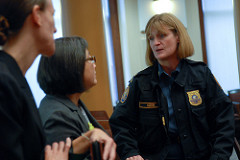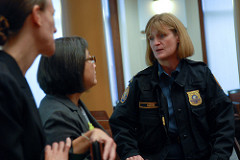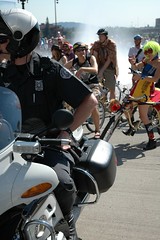
(Photos © J. Maus)
Today, the Portland City Council unanimously approved the Transportation Community Policing Agreement.
At yesterday’s Council meeting, the four City Commissioners (Mayor Adams is away) heard testimony from traffic safety advocates and representatives from the Police Bureau and the Bureau of Transportation (PBOT). There was also a screening of the bicycle traffic enforcement training video released last week.
Before the meeting, I sat down with Susie Kubota outside Council Chambers. Kubota is the aunt of Tracey Sparling, 19-year former art student who died on October 11, 2007 after being right-hooked by a garbage truck in downtown Portland. Sparling’s death, and the death of Brett Jarolimek 11 days later and a serious injury collision at the same location just two weeks after that, were the catalysts for this agreement.
“Yes, it’s empowering, I feel like I’ve been heard.”
— Susie Kubota, aunt of Tracey Sparling
Kubota said her experience of the last two years is a great example of how one person can make a difference. “Yes, it’s empowering, I feel like I’ve been heard.” Kubota said she jumped at the chance to express her gratitude. “Once I heard about this agreement coming to City Council, I thought it was a good opportunity for me to thank the City and the Police Department.”
But Kubota isn’t about to relax. She said this is a beginning, not an end, and that the agreement is just a promise, “and promises aren’t necessarily always met.” She then added, “I just want to make sure they stand by this proposal. It’s just a proposal, but it shows good intentions.”
Kubota also shared something she feels is missing from both the agreement and the bike traffic enforcement video: “One thing I think it’s left out is the automobile education part of it. The police video is great, but it’s focused on cyclists, and there’s a heck of a lot of education that needs to occur with drivers.”
“Sometimes it takes a tragedy to bring everyone together. There was so much pain, so much frustration, but really, we weren’t that far apart.”
— Portland Police Chief Rosie Sizer
Once the Council meeting got underway, as expected, everyone in attendance praised the partnerships and spirit of collaboration that have led to the creation of the video, the Community Policing Agreement, and the myriad other initiatives that have taken place in the past two years.
Acting Captain of the Police Bureau Traffic Division Bryan Parman was first to testify. Here’s a snip from what he said:
“Overall, we all want the same thing. Each of us is here today because we want our transportation system to be safe and comfortable to use regardless of the mode of transportation you choose. This CPA will formalize our partnership and set forth a process for identifying areas in our system that have the greatest needs for improvement.”
Greg Raisman, a traffic safety specialist with PBOT, pointed out how Portland’s traffic injury and fatality numbers are on a 22-year downward trend, saying, “It’s through these type of community partnerships that we’re able to really push the bar as to how safe we’re able to make our neighborhoods.”
Susie Kubota testified next. After Sparling’s death, Kubota publicly criticized the Police Bureau for their insensitive remarks and their handling of the situation. But today, she had much kinder words, saying that, “In the aftermath in the tragic events of that year, we have seen a remarkable change in the Bureau’s approach under Chief Sizer’s leadership.”
As each Commissioner gave their vote and shared remarks, Commissioner Saltzman (who’s also the Police Commissioner) shared his perspective on bike safety. “I don’t feel safe biking on city streets… but I think this framework of this agreement is what we need to get to that next level.”
After the meeting got underway, Police Chief Rosie Sizer walked in and sat quietly in the back row; just like she did on November 17th, 2007, when she attended the the “We Are All Traffic” rally off duty, in her civilian clothes.
Since those tragic events, Sizer has presided over a sea change in how the Police Bureau communicates, interacts, and works with the City and the community on bicycle-related issues.
It’s becoming quite clear that the reason for this sea change, as was directly noted in the new bike enforcement training video, is the transition in Portland from the old “outlaw edginess” (read: Critical Mass) of the past and the new, mainstream style of advocacy and activism that has taken it’s place.
I spoke with Sizer after the meeting. She said this new tone from bike advocates is what has made it possible for her and her staff to come to the table and work productively on bike traffic issues. Chief Sizer also acknowledged that the tragedy and outrage experienced by the community in October 2007 is what forced them to make these changes.
“Sometimes it takes a tragedy to bring everyone together. There was so much pain, so much frustration, but really, we weren’t that far apart.”
Sizer said another key in moving the relationship forward was “widening the conversation outside of the Traffic Division and to others in the [Police] Bureau.” Those “others” came to the fore in the bike traffic enforcement training video. “Those officers in the video are peer leaders, so it’s been very well received.”
On the personnel note, I asked Sizer if a major shift in Traffic Division leadership she made just months after the events of October 2007, helped move the community relationship forward . She, as I expected, dodged the question. “I won’t comment on that, but I will say that [former Traffic Division Captain] Larry O’Dea’s collaborative approach, demeanor, and humbleness were very important in making this happen.”
— Download the Transportation Community Policing Agreement here (96kb PDF).


